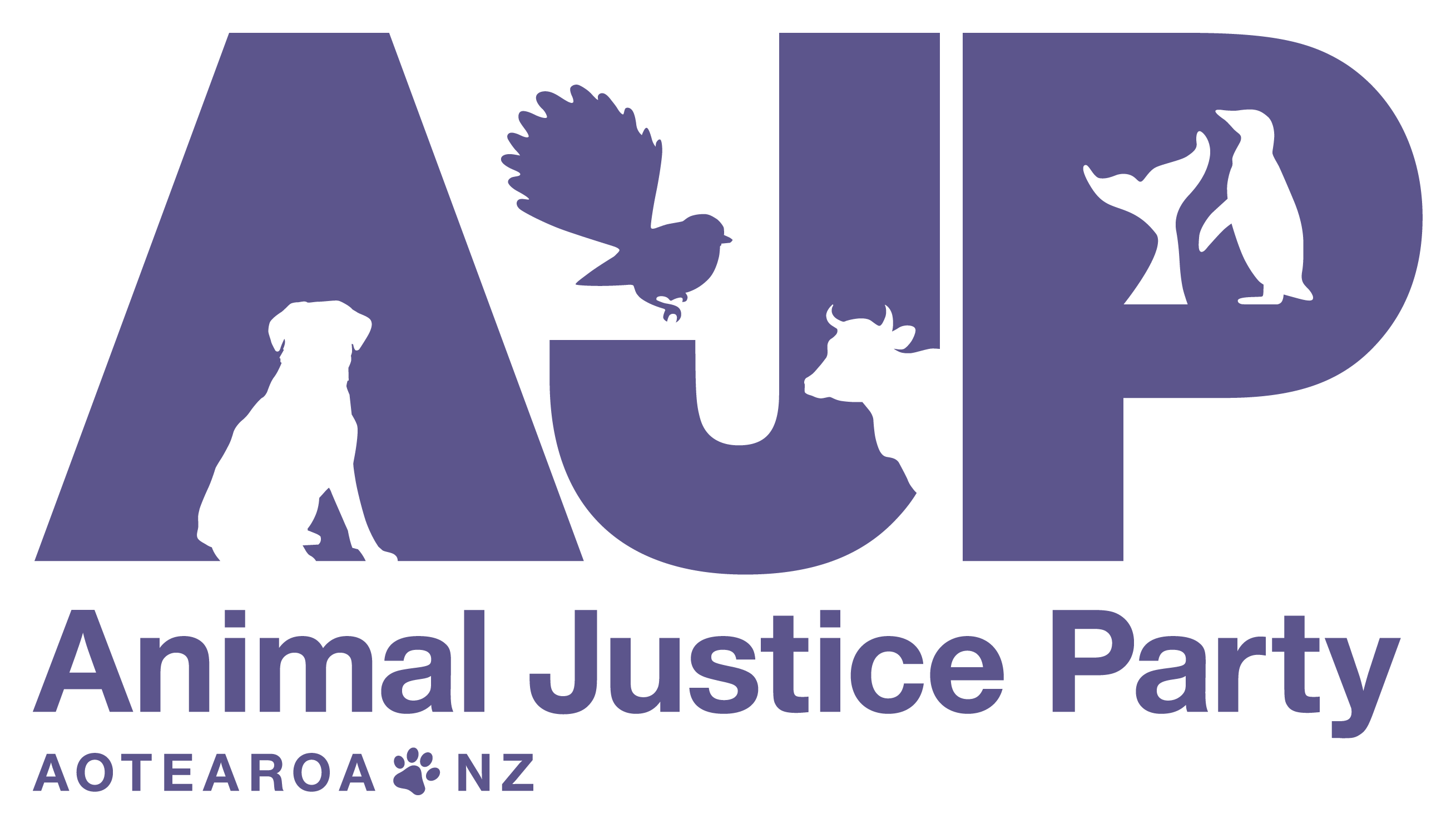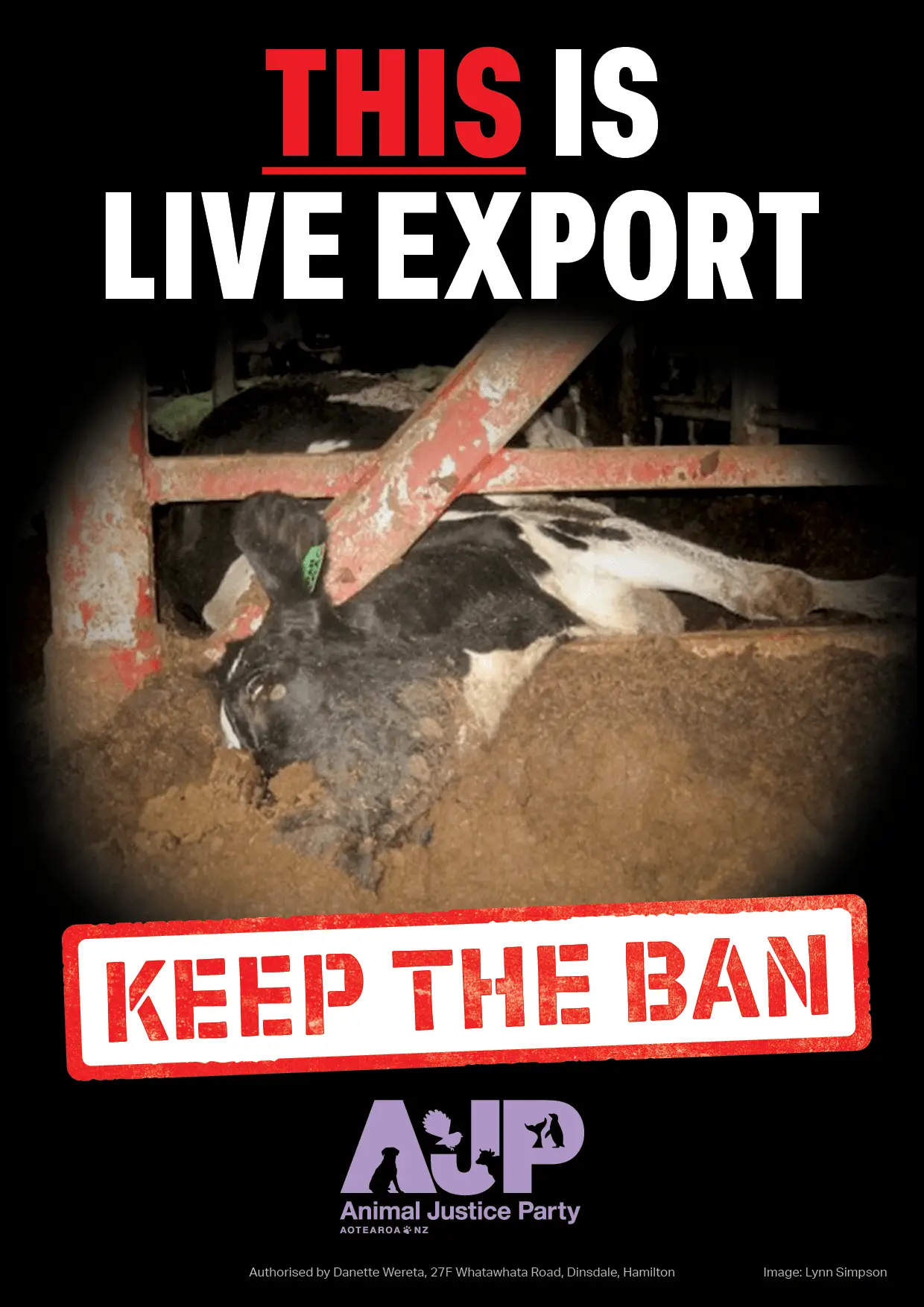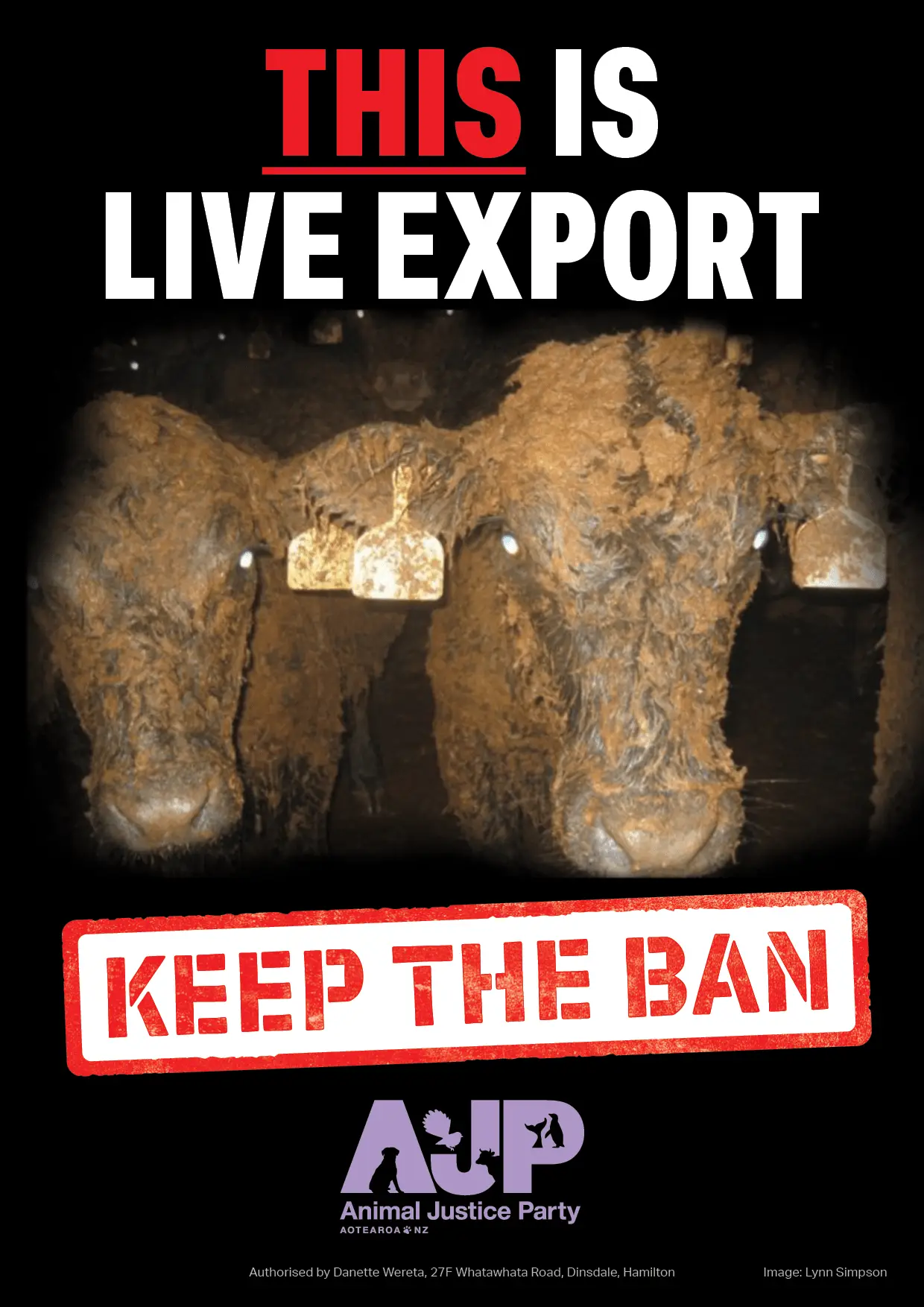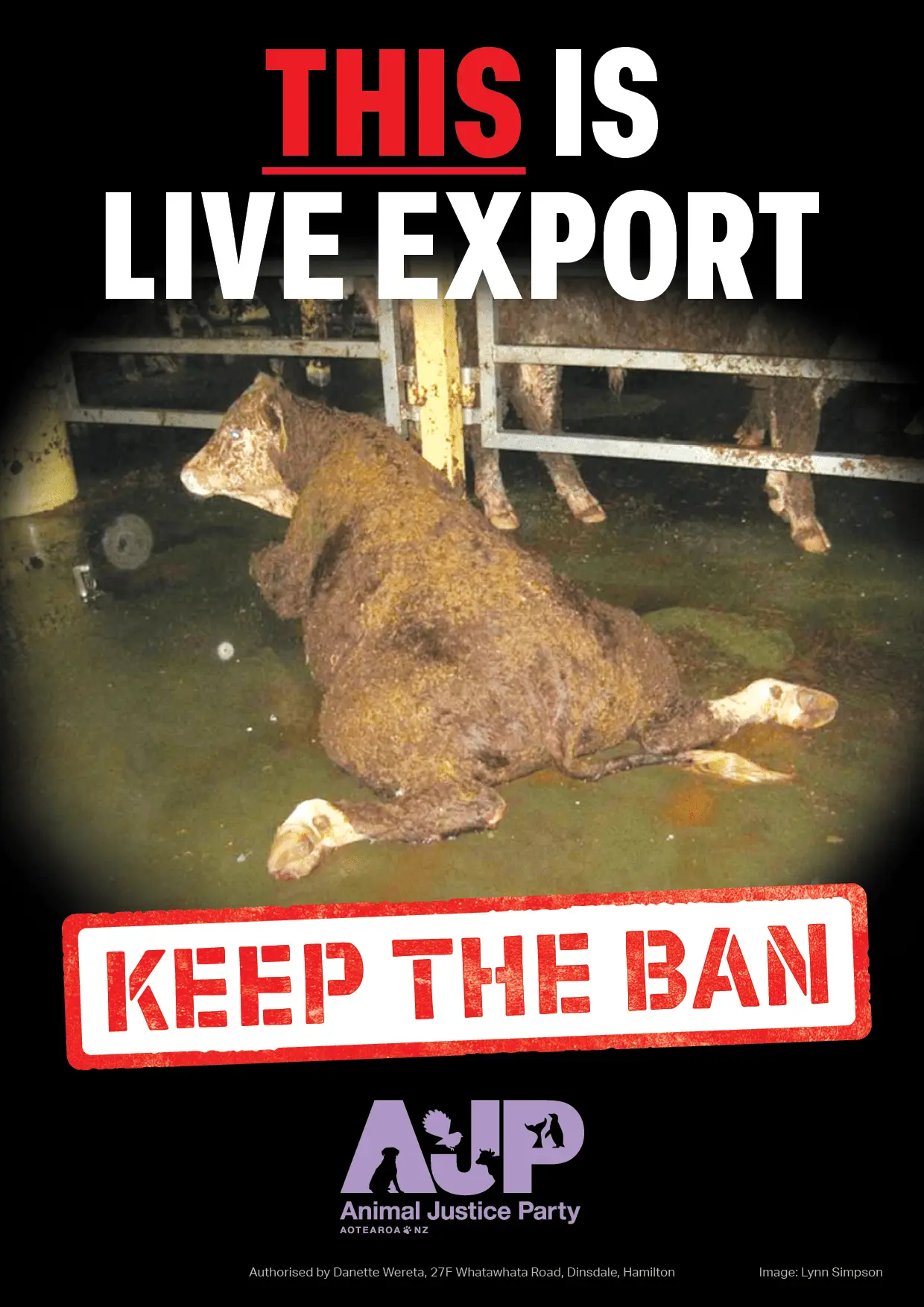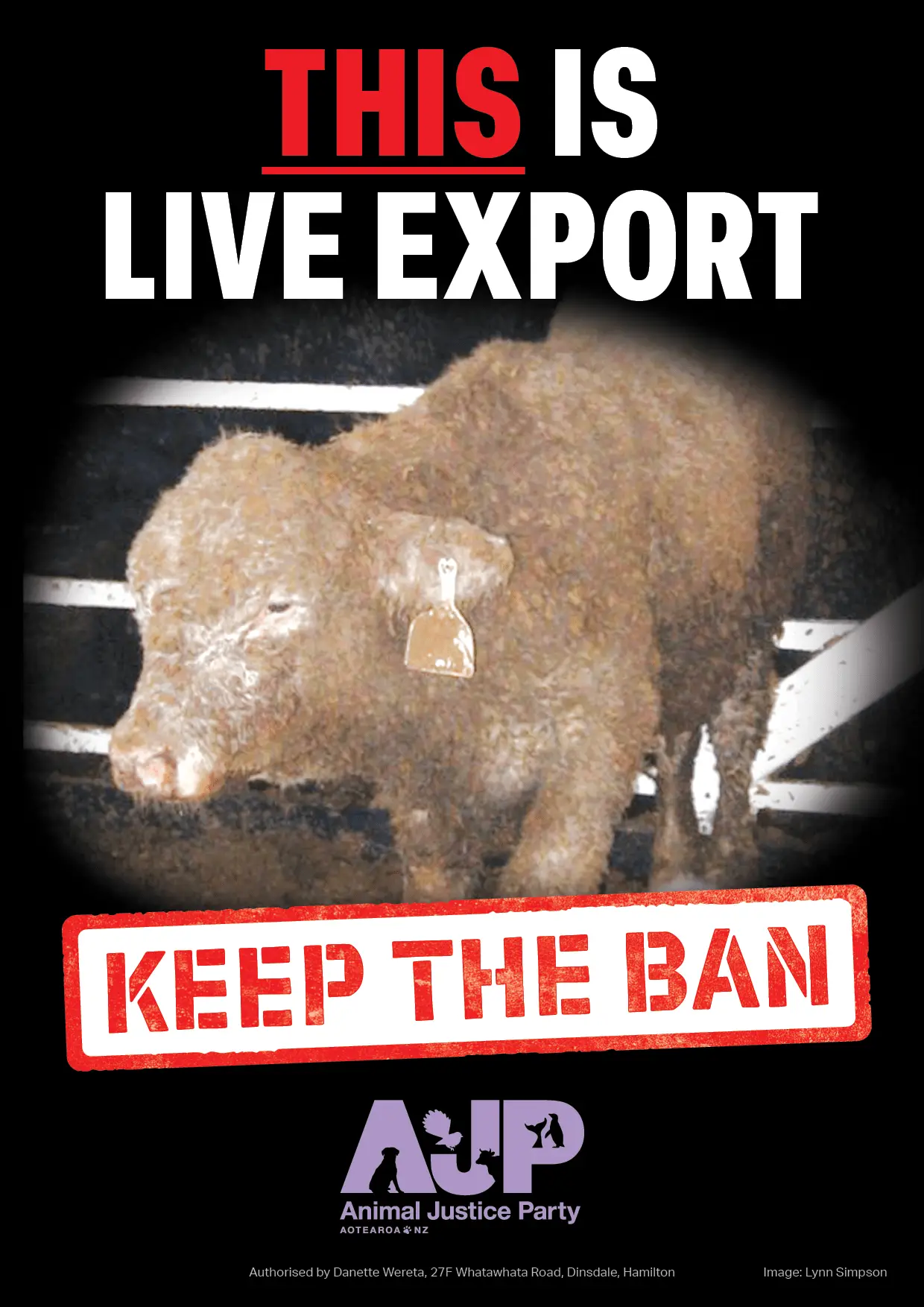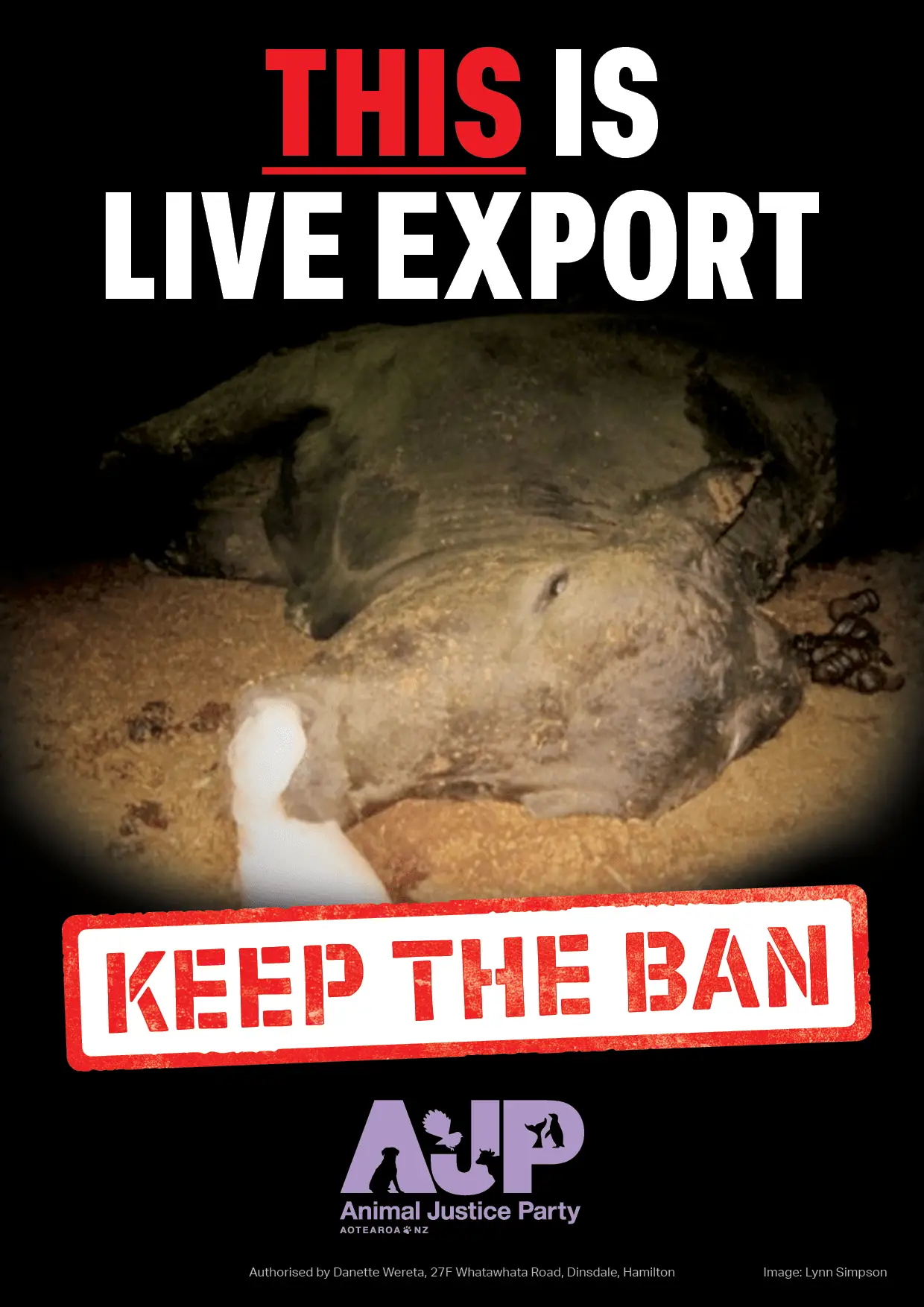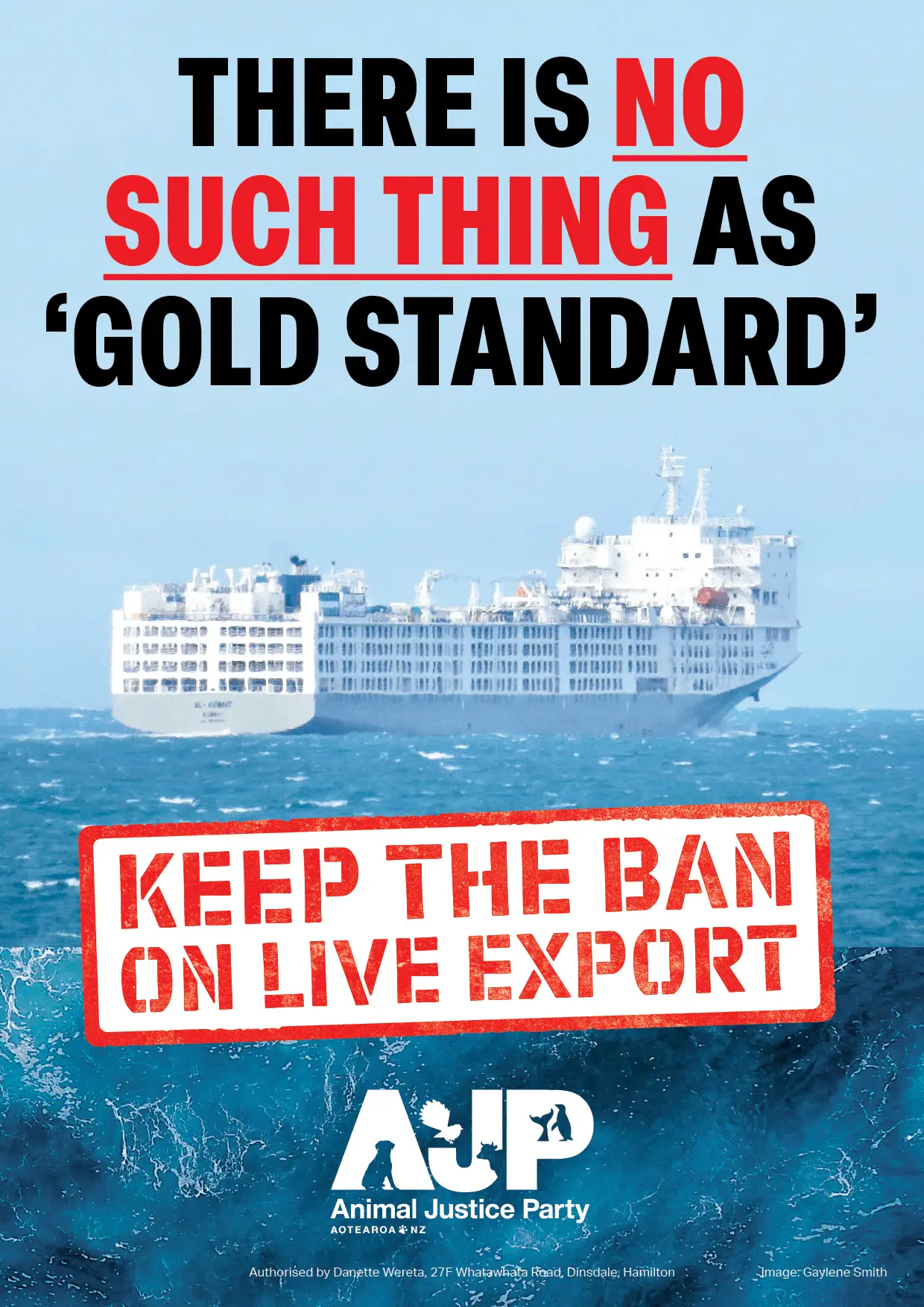Campaign Resources
Here you can access and download all our resources for promoting our campaigns yourself! Scroll down to see our resources.
Make Your Voice Heard: Animals Need Protection in Emergencies
The Emergency Management Bill (No 2) is being reviewed RIGHT NOW. This is our chance to ensure animals aren't left behind when disaster strikes.
Submissions Close: 11.59pm, Sunday 15 February 2026
Across the ditch, Australia’s bushfires are raging out of control. Hundreds of thousands of animals, both wild and farmed, are facing unimaginable suffering. Here in Aotearoa, it’s not if but when we face similar disasters. When floods rise, fires spread, or earthquakes hit, animals need protection too.
Why This Matters
Right now in Australia, wildlife are fleeing flames with nowhere to go. Horses and cattle are trapped in paddocks. Dogs and cats are separated from their families. Emergency responders want to help but often lack the authority, resources or coordination to act quickly enough.
Animals, both companion and farmed, depend entirely on humans for their survival, care, and safety. When systems fail, they have no ability to escape or seek help on their own.
New Zealand has experienced this too. During the Edgecumbe floods, Cyclone Gabrielle, and the Christchurch earthquakes, countless animals were left stranded, injured, or worse. Lessons from these events were never formally captured or acted upon.
International experience shows the consequences of ignoring animals in disasters. During Hurricane Katrina in 2005, tens of thousands of companion animals were abandoned as people evacuated. Many died from starvation, injury, or drowning. Less than 5% were ever reunited with their families. In response, the United States introduced the PETS Act to mandate animal-inclusive emergency planning. New Zealand can learn from this: without clear rescue protocols and recognition of animal sentience, disasters will lead to preventable suffering.
Animals feel fear, pain, and loss just as we do. They deserve to be part of our emergency planning – not an afterthought.
Select committees are influenced by public submissions. Each voice strengthens the case for amendments.
Our Position
We offer conditional support to this Bill IF these non-negotiable amendments are adopted.
The Bill has taken small steps forward:
✓ Regional plans must now address animal management during emergencies
✓ Emergency Controllers can enter property to prevent animal cruelty (though this is undermined by requiring them to contact owners first, and conditions for entry are more restrictive than for protecting human life)But the current provisions are insufficient and incomplete. Without the amendments below, this Bill perpetuates the systemic failures documented in Edgecumbe and Cyclone Gabrielle. Animals deserve more than scattered clauses treating them as property.
How to Submit
- Visit the Select Committee webpage
- Click “Make a submission”
- Submit as an individual (you don’t need to represent an organisation)
- You can choose whether to speak to the Committee in person (optional but powerful)
- Write in your own words why this matters to you
Your submission doesn’t need to be long or formal. What matters most is that it’s genuine and in your own words.
What to Include in Your Submission
Choose the issues that resonate most with you. You don’t need to cover everything, even focusing on one or two points makes a powerful submission.
Start with your position
“I offer conditional support to this Bill IF the following amendments are adopted. Without these changes, particularly the Tier 1 issues, this Bill perpetuates the failures.”
Then choose from these critical gaps:
We’ve organised them by priority to help you focus on what matters most.
TIER 1: CRITICAL (Non-Negotiable)
These gaps will result in animal deaths and suffering if not fixed.
- Animals treated as property
- Current law treats animals as property, which limits the ability of responders to prioritise their welfare. We urge the Bill to explicitly recognise animal sentience and welfare during emergencies, to ensure decisions are not solely based on property considerations.
- The Bill uses ‘human life’ language (Clauses 3, 125, 128.1, 161.1) without recognising animals as sentient. Animals are treated as objects/property in emergency powers rather than as sentient stakeholders.
- The Animal Welfare Act 1999 recognises animals as sentient (capable of feeling pain, fear, joy). This Bill must align with that recognition. This means animals’ welfare must be considered on its own terms; ‘destroy’ must be last resort (with vet assessment), not default; emergency responders must prioritise animal welfare, not just incidental human benefit. Need: Amend Clause 3 (Purpose) and Clauses 125, 128.1, 161.1 to include ‘people and animals’; add sentience language throughout.
- No plan for rescued animals
- What happens after rescue? Current powers to ‘destroy’ animals only apply during states of emergency and can be made unilaterally. Any decision to euthanise should require consultation with a registered veterinarian.
- Many animals aren’t formally ‘rescued’ but become displaced during evacuations. Current provisions only apply during states of emergency. We need extended holding periods (30 days, not the current 7) to give families time to find their animals. In Hurricane Katrina, less than 5% of animals were reunited with their families.
- Insert new clause after Clauses 129 & 162 (Powers to enter premises and places) specifying: 30-day holding period (not just during state of emergency), microchip scanning, adoption-first rehoming hierarchy, protection for disability assistance dogs, detailed record-keeping, Crown funding for all animal care costs and requirement that any euthanasia decision must be made in consultation with a registered veterinarian. Destruction for convenience prohibited
- Red tape blocks fast rescue
- Responders must “contact owner first” (Clauses 129.3, 162.3) even during active disasters
- Need: Remove this delay; allow immediate entry when animals face imminent danger
- Assistance dogs ignored
- Disabled people won’t evacuate without their dogs
- Insert new clause(not currently addressed in Bill; related to Clause 128 evacuation powers): Explicit protection so assistance dogs stay with handlers; evacuation centres must accommodate them
- No coordination between agencies
- Who rescues companion animals? Farmed animals? Wildlife? The Bill doesn’t say. Currently in NZ no agency is mandated and funded for animal disaster rescue.
- Amend Clause 69-70 (Lead Agencies) to designate: Clear responsibilities (FENZ = companion animals, MPI = farmed animals, DOC = wildlife, NEMA = coordination)
- No plan for farmed animals in disasters
- Australia’s fires show the reality: hundreds of thousands trapped
- Amend: Clause 91 (Regional Planning requirements) to require animal-specific protocols and designate MPI as lead agency (Clause 69-70). Farmers generally want to care for their animals but need clear authority and coordination support from MPI and Civil Defence to act quickly when disaster strikes.
- Need: Animal-specific protocols that support farmers’ efforts with coordination as they request it
- Animal Welfare Act (AWA) can be overridden in emergencies
- The Animal Welfare Act legally applies during emergencies (Clause 12) but can be overridden by emergency powers. Emergency management personnel often don’t understand AWA requirements, creating confusion about animal welfare responsibilities during disasters.
- Need: Link Bill to AWA (Clauses 202-204); ensure sentience recognition cannot be overridden; keep welfare standards explicitly enforceable during emergencies.
- ‘Emergency’ doesn’t include events affecting animals
- The Bill’s definition of ’emergency’ and ’emergency management’ doesn’t explicitly include events affecting animals
- Need: Amend Clause 6 (meaning of emergency) to include events affecting animals that are beyond capabilities of emergency services or require significant coordination; Amend Clause 5 (emergency management definition) to include “safety of the public, animals, or property
- No requirement for evidence-based planning
- Nothing mandates that emergency plans use current scientific and technical evidence
- Need: Mandate that emergency regulations, plans, strategies, rules, codes, and other documents prescribed under the Bill must use scientific and technical evidence in their development
TIER 2: HIGH PRIORITY (Essential for Comprehensive Protection)
Without these, animals will continue to suffer unnecessarily.
- Frontline responders unfunded
- Groups like HUHA operate as volunteers
- Need: Formal recognition as essential services (Clauses 7, 44-45, 69-71); Territorial authorities already have mandate for companion animals. Bill should clarify that charities working under territorial authority agreements can be contracted and reimbursed, with costs eligible for central government reimbursement.
- Wildlife protection missing
- No clear DOC mandate or ecosystem framework. All animals (native, introduced, or urban) can suffer during disasters. While some planning exists for high-profile species like stranded whales, there’s no comprehensive approach to protecting wildlife during events like forest fires, floods, or droughts.
- Amend Clauses 69-70 (Lead Agencies), 77 (National Strategy), 83-87 (National Plan) to designate DOC for wildlife response, clear wildlife rescue protocols; integration with biodiversity goals
12. Can’t enter marae for animal welfare
- Entry only allowed for human life, not animals
- Amend Clauses 129.2c & 162.2c (currently exclude marae from animal welfare entry), include animal welfare as valid justification; recognise cultural significance of mokai kuri; develop protocols with iwi
13. No lessons management
- Lessons from all emergencies must be captured, including animal welfare success and failures.
- Amend: Clause 168 (After Action Reports) to require animal welfare component: mandatory After Action Reports stored in National Library; include animal welfare; require evidence-based updates
14. No national strategy
- Only regional requirements create inconsistent care.
- Animals are a core part of emergency response and deserve consistent national standards.
- Need: National framework (Clauses 77-87); consistent standards; coordinated resources
TIER 3: MODERATE PRIORITY (Important Improvements)
These create a more robust system over time.
15. No independent oversight
- No mechanism to ensure recommendations and public concerns, including issues around animal emergency response, are properly considered.
- Need: Independent Inspector-General (like Queensland/Victoria models); ensures accountability and transparent decision-making
- Response methods can harm animals
- Helicopters, sirens, evacuations may injure wildlife.
- The Animal Welfare Act already provides some pragmatic exclusions around emergency circumstances, but explicit assessment requirements would strengthen protections.
- Amend Clauses 130, 163 (Cordon management), 202-204 (Liability protections): Require assessment of secondary harm; mandate mitigation; train responders
Closing statement
“These amendments are essential, not optional.”
Your Submission Matters
Thank you for speaking up for animals. Your voice can help ensure Parliament hears what New Zealanders have been saying for years: it’s time to include animals in emergency planning.
Even one or two paragraphs focusing on the issues that matter most to you can make a real difference.
Don’t wait – submit today! Submissions close Sunday 15 February 2026.
Pigs can’t turn around, and neither should we.
10 more years of cruelty is 10 years too many. Make your voice heard: submissions close 23 October. Use the AJP template to help!
The government has announced it will allow the continued use of cages (farrowing crates and mating stalls) for another ten years, with mother pigs confined for shorter periods.
The High Court already ruled this suffering unlawful in 2020. Every extra day means more pigs suffering, trapped, frustrated, and unable to express their natural instincts. This delay isn’t about welfare. It’s about short-term costs.
You can help! Submissions close 5pm, Thursday 23 October 2025.
We’ve made it easy: copy, paste, or edit the template submission below. We recommend you personalise it and this can be done by sharing at the start how this makes you feel. Just a few sentences from the heart make a difference.
Step 01. Go to Animal Welfare (Regulations for Management of Pigs) Amendment Bill – New Zealand Parliament.
Click “I am ready to make my submission”.
Step 02. Click “I am submitting as an individual” and “no” if you don’t want to be selected for an oral submission. Then add in your details.
Step 03. Copy & paste into the submission form:
I/We wish to make the following comments:
Animal Cruelty and Welfare Obligations
Mother pigs are confined in cages where they cannot turn around, lie comfortably, or build nests. Mating stalls are also used, yet the National Animal Welfare Advisory Committee (NAWAC) has repeatedly advised that pigs should never be confined for mating. These cages cause physical injury, mental distress, and long-term suffering.
The Animal Welfare Act 1999 requires owners to prevent unnecessary pain and distress. Caging mother pigs breaches this obligation. The 2015 Amendment explicitly aimed to end non-compliant practices, including cages. The High Court in SAFE & NZALA v Minister (2020) ruled that “farrowing crates” are unlawful and invalid.
Allowing cages until 2035 is a deliberate attempt to override Parliament’s intent and the court’s authority. It turns back the clock on welfare standards that New Zealand has already legally and ethically outgrown.
Implications:
Legal and moral obligations cannot be delayed for economic convenience. Every day cages remain in use is another day of sanctioned cruelty and statutory breach. To compare: it would be unacceptable to leave children in classrooms lined with asbestos because renovations are expensive. It would be unlawful to allow cars with faulty brakes to operate for a decade because the fix costs too much. Yet this is what the government proposes for pigs, knowingly permitting harm that the law already forbids.
Legal Compliance and Parliamentary Intent
Regulations 26 and 27 (under section 183A(1)) currently allow “farrowing crates” and mating stalls to continue indefinitely. Section 183A(2), however, was designed specifically for time-limited phase-outs of practices inconsistent with the Act. That pathway has been ignored.
Regulations cannot lawfully override the purpose of the Animal Welfare Act or the 2015 Amendment. Extending the use of cages until 2035 violates the rule of law and undermines judicial authority.
Implications:
The law requires that non-compliant practices be eliminated, not extended with new conditions. Government action that knowingly allows ongoing illegality risks renewed court action and erodes public trust in animal welfare enforcement. It sets a highly risky precedent that statutory duties can be weakened for political or industry convenience.
Economic and Practical Considerations
The industry claims that upgrading facilities will cost around $675,000 per farm, and that removing cages will increase piglet deaths and force farm closures. These claims ignore both animal welfare science and long-term economic reality. Across Europe, modern free-farrowing systems have already reduced piglet losses through design improvements and animal-centred management. The idea that cruelty protects piglets is false, it’s an outdated excuse to preserve a broken system.
Cages and intensive indoor systems also create hidden public costs: high waste output, polluted waterways, and dependence on antibiotics to manage stress-driven illness. These are not just welfare issues but environmental and human health concerns.
Meanwhile, more than 60% of ‘pork’ consumed in New Zealand is imported from countries with far lower welfare standards.The solution is not to keep our cruelty to compete, but to raise import standards so all ‘pork’ sold meets our legal expectations.
Implications:
Cost cannot justify unlawful cruelty. Compliance brings long-term benefits: Reduced legal and reputational risk, protection of export credibility and trade access and public confidence in genuine animal welfare enforcement.
Delaying reform imposes hidden costs: legal risk, public distrust, and reputational damage that will far exceed the cost of compliance. The precedent of ignoring the 2015 Amendment, the 2020 High Court ruling, and NAWAC’s consistent advice weakens the rule of law and signals that statutory obligations are optional.
I/We wish to make the following recommendations
Every day of delay is unjustifiable cruelty, to piglets, mother pigs, and the integrity of New Zealand law.
- Immediate action is required: Farrowing crates and mating stalls should be phased out entirely, not retained indefinitely under reduced confinement rules.
- Time-limited transition: Given the lack of action to date, this needs careful planning. If a transition period is unavoidable, it must be realistic but short, respecting both animal welfare and legal obligations.
- Government accountability: Minister Hoggard and MPI must comply with the law, honour Parliament’s intent, and uphold judicial rulings.
- Industry support: Provide financial or technical assistance to farmers to ensure compliance.
Recommendations
- Reject the current proposal to allow cages indefinitely under reduced confinement times.
- Set a firm deadline well before 2035, given it’s been 5 years already, another 10 is unacceptable.
- Mandate reporting and independent monitoring to ensure compliance.
- Provide transition support for farmers (grants, infrastructure assistance, technical guidance).
- Public transparency: Engage stakeholders, including animal welfare organisations and the public, in reporting and oversight. Given current conditions are impossible to prove, manage or have oversight of.
Thank you for your consideration.
Ban Duck Shooting in Aotearoa
Ban Duck Shooting in Aotearoa
How to Use Email Templates to Correspond Effectively with Recipients
- Make it Yours: Add your own touch! Templates give you a head start, but personalise it with your thoughts as sometimes a templated email is ignored.
- Ring Ring! Sometimes, Talk is Better: For big issues or a good chat, consider calling or setting up a meeting with people.
- Don’t Forget Basics: Include your full name and address when emailing. If emailing a MP, it helps them recognise you’re a constituent and increases the chance of a response.
- Ping! Ping! Follow Up: If you don’t hear back, send a friendly reminder. Sometimes emails get lost, so a gentle nudge can help your message get noticed.
Email: [email protected]
Find your local MP: Find your Member of Parliament (MP) | New Zealand Government (www.govt.nz)
Subject: [Personalise the subject line, so less chance of it being deleted]
Kia ora Hon Todd McClay, [Local MP’s Name],
I am writing to urge you to take immediate action to ban duck shooting across Aotearoa, as it is a practice that is not only inhumane but also ecologically damaging.
Three species of native duck are allowed to be shot under the law. It’s hypocritical to invest millions of taxpayer dollars into efforts aimed at safeguarding our invaluable native bird populations only to have a duck shooting season. Furthermore, there is a large number of ducks that are maimed and wounded, which is against the humane slaughter laws in the Animal Welfare Act. The killing of animals must be done according to the Animal Welfare Act 1999. This Act makes it an offense to kill an animal in a way that causes unreasonable or unnecessary pain or distress.
Western Australia banned duck hunting in 1990, NSW followed suit in 1995 and Queensland banned the practice in 2005. Why is Aotearoa so behind?
Recent reports and investigations globally show the harsh reality of duck shooting, exposing the unnecessary suffering inflicted upon thousands of waterbirds each year. Ducks, along with other native waterbirds, deserve to live their lives peacefully, free from the threat of being injured or killed for the sake of so-called “sport.”
Duck shooting is not a sport; it is nothing short of savagery. Shooting down defenceless animals cannot be justified as entertainment or sport by any stretch of the imagination. In fact, it goes against the very essence of what sport represents – fair competition and skilful engagement.
Ducks are intelligent and hold very special relationships. They are capable of abstract thinking and have deep emotional lives. If a single duck manages to survive the carnage they will ‘mourn’ the partner they bonded with.
Furthermore, duck shooting exacerbates the decline of wetlands and threatens endangered species. The supposed conservation efforts tied to hunting are unfounded and only serve to perpetuate ecological harm.
As a concerned citizen, I ask you to call an end to this barbaric practice. I have copied [Local MP’s Name] on this email as well, as I believe our local representatives must advocate for the welfare of our wildlife and ecosystems [Optional: And I will be seeking to meet them shortly].
Please consider this urgent matter seriously and take decisive action to ban duck shooting once and for all.
Nāku noa, nā [Your Name] [Your Contact Information]
Keep the Ban on Live Exports
How to Use Email Templates to Correspond Effectively with your MP
Make it Yours: Add your own touch! Templates give you a head start, but personalise it with your thoughts as sometimes a templated email is ignored.
Ring Ring! Sometimes, Talk is Better: For big issues or a good chat, consider calling or setting up a meeting with your MP for a proper conversation.
Don’t Forget Basics: Include your full name and address when emailing. It helps MPs recognise you’re a constituent and increases the chance of a response.
- Ping! Ping! Follow Up: If you don’t hear back, send a friendly reminder. Sometimes emails get lost, so a gentle nudge can help your message get noticed.
Subject: Are you on the right side of history?
Kia ora [MP’s Name],
I am writing to you today to express my strong opposition to the potential reinstatement of live animal exports from New Zealand. This decision not only poses significant risks to animal welfare but also threatens to undermine our nation’s reputation and economic success.
As you are aware, the ban on live export plays a crucial role in upholding New Zealand’s image as a clean, green country with high animal welfare standards. Our commitment to ethical practices is worth billions to our economy and has influenced global trade agreements. Reversing this ban could have severe economic and diplomatic repercussions, jeopardising the progress we’ve made in international relations.
The minimal contribution of live exports to our economy, constituting only 0.6 percent of primary sector exports, pales in comparison to the potential damage to our reputation if the ban is overturned
Recent events, including the sinking of the Gulf Livestock I, the stranding of over 15,000 sheep and cattle off the coast of West Australia, the foul odour in Cape Town caused by a live export vessel, and distressing footage of live export voyages, underscore the inherent dangers and inhumanities associated with this practice. Despite attempts to enhance shipping conditions, the fundamental issues persist unresolved. Animals experience considerable suffering during lengthy journeys, enduring injuries, stress, and dehydration that cannot be effectively mitigated through ship upgrades. These problems stem from the inability to shorten the duration of the journeys.
Once animals arrive at their destination, they fall outside the protective umbrella of New Zealand’s Animal Welfare Act, exposing them to suffering in unregulated environments. Reinstating live exports to countries with low animal welfare standards, such as China, compromises our farmers’ reputations and our global image as leaders in animal welfare.
This isn’t just about politics or economics; it’s about morality and humanity. It’s about standing on the right side of history and refusing to compromise our values
As a constituent in your region I am keen to know your thoughts on this matter, including how you potentially intend to vote should this come up this term.
Ngā mihi maioha,
[Name]
How to Use Email Templates to Correspond Effectively with Recipients
- Make it Yours: Add your own touch! Templates give you a head start, but personalise it with your thoughts as sometimes a templated email is ignored.
- Ring Ring! Sometimes, Talk is Better: For big issues or a good chat, consider calling or setting up a meeting with people.
- Don’t Forget Basics: Include your full name and address when emailing. If emailing a MP, it helps them recognise you’re a constituent and increases the chance of a response.
- Ping! Ping! Follow Up: If you don’t hear back, send a friendly reminder. Sometimes emails get lost, so a gentle nudge can help your message get noticed.
Subject: Potential reinstatement of live animal exports
Tauranga Port
Timaru Port
Kia ora,
I am writing to address concerns surrounding the potential reinstatement of live animal exports through [Port Name]. This issue holds significant implications not only for shareholders and stakeholders but also for the wider community.
It is crucial to consider the ethical and reputational risks.
It is not hard to find examples of the devastation caused by this trade. Recent incidents, such as the tragic sinking of the Gulf Livestock 1 in the East China Sea which sailed from Napier, serve as poignant reminders of the risks involved in live animal exports. The loss of human lives and New Zealand cattle in this incident highlights the gravity of the situation.
Ongoing tragedies with live animal exports in other regions further highlight the inherent risks and uncertainties associated with this industry and the negative global attention to the Ports. Examples include the MV Bahijah, with more than 15,000 sheep and cattle stranded off the coast of West Australia, creating a PR nightmare for the port of Fremantle and a literal nightmare for the animals. While in Cape Town a stench impacting the town was discovered to come from a livestock ship docked in the harbour.
It is important that you carefully consider the potential consequences of reinstating live exports. While improvements to shipping standards may be touted as addressing some concerns, it is essential to recognise that fundamental issues remain unresolved. Long-distance journeys inherently expose animals to various forms of distress and suffering, which cannot be mitigated through improved shipping conditions.
I’d love to learn your perspective and insights on how we can uphold the integrity and reputation of [Port Name] and ensure the welfare of animals and the well-being of our community.
Ngā mihi maioha,
[Name]
